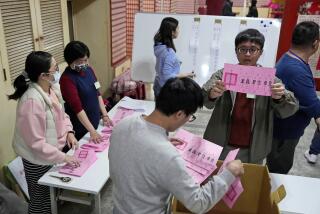Shut down the government? Taiwan lawmakers duke out disputes
TAIPEI, Taiwan – When Taiwanese lawmakers exchanged blows in August, two of them rolled around on the floor, locked in some sort of amateur wrestling hold.
Another one pulled up his sleeves to show off his biceps. A ruling party legislator cast an arc of water on an opposition rival who had commandeered the podium in the wood-paneled, arena-like assembly room with its doors tied shut.
Gridlock in Congress shut down much of the U.S. government this week for the first time in 17 years, but legislators in Taiwan have been known to sometimes duke out their disputes.
Brawls in the parliament put Taiwan on the world gee-whiz map in the 1990s, and then a relative calm settled in about five years ago, a would-be turning point for the young democracy. But the parliament has seen at least three fights since June, as parties spar over deep differences on trade with China and development of nuclear power even as many analysts say the bouts are widely perceived as a media stunts.
“Taiwan’s public is used to it,” said Ku Chung-hwa, standing board member of Taipei-based legislative oversight group Citizens’ Congress Watch. Though politicians brawl in other emerging democracies, in Taiwan “some people will think that to fight is like a child.”
Some scholars in Taipei said many people expect more from Taiwan, the world’s 26th-largest economy.
“What’s more important is what’s going on domestically, like in the economy and whether investors will come here,” said Tung Chen-yuan, professor of development studies at National Chengchi University in Taipei, the Taiwanese capital.
Democratized in the 1990s after decades of authoritarian rule, Taiwan became known then for legislative brawls involving punches, yanked neckties, thrown objects and groups of people spilled over one another like football players. Some fights left lawmakers injured.
But when the ruling Nationalist Party gained an unusually large two-thirds parliamentary majority in 2008, fighting decreased because the public started paying less attention to legislators, figuring decisions would favor the president. The calm also fostered better consensus and “indicated Taiwan’s democracy had improved,” ruling party legislator Tsai Chin-lung said.
Legislators say the opposition Democratic Progressive Party, known for a socially liberal agenda and cautious stance on relations with China, has resumed fighting lately because it cannot find compromise on two knotty issues.
The minority opposes an early referendum on whether to finish Taiwan’s fourth nuclear power plant, preferring to hold one next year along with mid-term elections to increase voter turnout. It also questions a deal signed with China in June to liberalize trade in 144 service sectors. The Nationalists prefer an early nuclear power plebiscite and back the pact with China.
Opposition party members, who go up for reelection next year, have literally fought to be seen protecting Taiwanese midsized businesses from the China deal, said William Sharp, professor and author of the book “Random Views of Asia from the Mid-Pacific.”
Opposition lawmakers also want to be remembered for supporting the hundreds of thousands of anti-nuclear protesters who share their party view against a fourth power plant.
Some say those who fight in the parliament risk loss of support.
“It’s kind of going from anger to frustration to ennui to helplessness,” said Taipei resident Jay Lin, 40, describing his reactions. “If you have legislators who are willing to work with each other, you’re more likely to have a cohesive plan for the country.”
ALSO:
American’s viral ‘I quit’ video hits home in Taiwan
Russia evacuates personnel from Libya in wake of embassy attack
Swarms of hornets kill 42 people, injure hundreds in northwest China
Jennings is a special correspondent.
More to Read
Start your day right
Sign up for Essential California for news, features and recommendations from the L.A. Times and beyond in your inbox six days a week.
You may occasionally receive promotional content from the Los Angeles Times.






